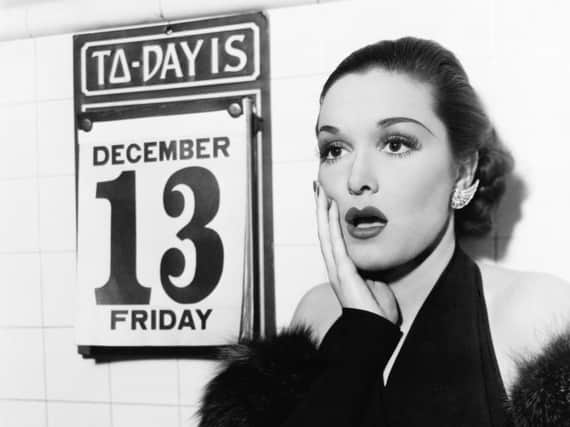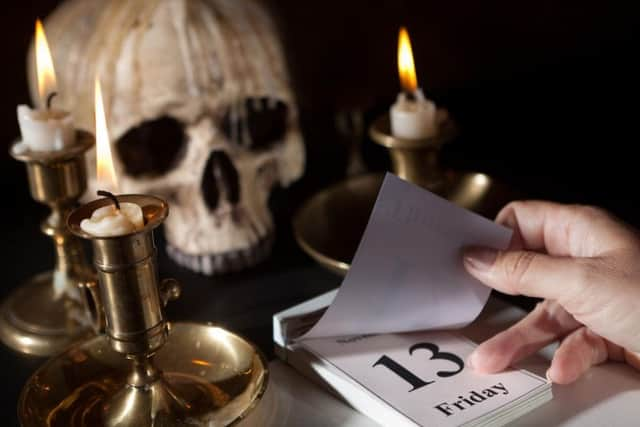Friday the 13th: The superstitious origins surrounding this ill-fated day


This Friday, April 13, will be the first Friday the 13th of 2018, but where exactly did this superstitious day arise from and why is it so feared?
The origins of Friday the 13th
Friday the 13th hails from Western superstition, where it is deemed unlucky when the 13th day of the month falls on a Friday.
Advertisement
Hide AdAdvertisement
Hide Ad

Although this happens at least once a year, it can occur up to three times in the same year. This year will be the same as last year, as the 13th day of the month will fall on a Friday twice, occur first on April 13 and then again on July 13.This will continue every year until 2020, where 2021 and 2022 will only have one Friday the 13th.
The official name for the fear of Friday the 13th is ‘paraskevidekatriaphobia’, which originates from the Greek word Paraskeví meaning ‘Friday’ and ‘dekatreís’ meaning ‘thirteen’.
It is said that the very first superstition regarding this day may have begun in the Middle Ages and originated from the story of Jesus' last supper and crucifixion, with 13 individuals being present on the 13th of Maundy Thursday, the night before his death on Good Friday.
Another suggested origin of this superstitious day dates back to Friday October 13 in 1307, the day when Philip IV of France arrested hundreds of the Knights Templar and mentioned in the 1955 historical novel The Iron King, by Maurice Druon, before John J. Robinson's ‘Born in Blood: The Lost Secrets of Freemasonry’ in 1989, and Dan Brown's novel ‘The Da Vinci Code’, 2003.
Advertisement
Hide AdAdvertisement
Hide Ad

The first documented reference in English about Friday the 13th, takes places in Henry Sutherland Edwards' 1868 biography of Gioachino Rossini, a man who died on Friday the 13th of November.
The publication of Thomas W. Lawson's novel ‘Friday, the Thirteenth’, in 1907, also focused on this unlucky day, but it was a tale which focused on the suspected untruth regarding this superstitious day
In Lawson’s novel, a broker takes advantage of this particular superstition in order to create a panic on Wall Street on Friday the 13th.
In Spanish-speaking countries and in Greek culture, Tuesday the 13th is instead regarded as an unlucky day and in Italian popular culture, Friday the 17th is a day considered to be unlucky.
Three of the UK’S most renowned Friday the 13th events
The bombing of Buckingham palace during WWII
Advertisement
Hide AdAdvertisement
Hide AdBuckingham Palace was a prominent target for bombings during World War II and on September 13 1940, five bombs were dropped on the royal palace, killing one person and destroying both the Royal Chapel and the water main.
This particular attack is considered the most destructive one on on Buckingham Palace during WWII.
Lightning strike at precisely 13.13
In August 2010, a teenage boy was struck by lightning in Suffolk. Although he luckily didn’t suffer any serious injuries, this eerie event occurred at precisely 13:13 on Friday
13th, with some believing this was more than just a coincidence.
Theme park nightmare
Advertisement
Hide AdAdvertisement
Hide AdIn March 2009, the opening night of Thorpe Park’s ‘Saw’ brought to an eerie halt on Friday the 13th.
The ride is associated with the series of gruesome horror films in the ‘Saw’ franchise, so it’s eerily coincidental that on the opening night of this ride, with celebrity guests of honour in tow, the ride was forced to shut because of multiple strange mechanical faults.